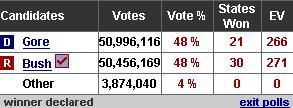Academics Use Formulas to Predict Bush Win
Reuters — Academics Use Formulas to Predict Bush Win
olls may show the presidential race in a dead heat, but for a small band of academics who use scientific formulas to predict elections President Bush is on his way to a sizable win. That’s the conclusion of a handful of political scientists who, with mixed results, have honed the art of election forecasting by devising elaborate mathematical formulas based on key measures of the nation’s economic health and the public’s political views. Most of these academics are predicting Bush, bolstered by robust economic growth, will win between 53 and 58 percent of the votes cast for him and his Democratic opponent John Kerry.
Their track record for calling election outcomes months in advance has often been surprisingly accurate. In 1988, the models projected Bush’s father, former President George Bush, would win even though Massachusetts Gov. Michael Dukakis enjoyed a double digit poll leads that summer. And in 1996, one model came within a tenth of a percentage point of Clinton’s actual vote share. “You can look at certain fundamental indicators and anticipate how the campaign will play out,” said James Campbell, a professor at the State University of New York at Buffalo.
But one glaring error is what the forecasters are perhaps best remembered for: they predicted in 2000 that Democrat Al Gore would win easily, pegging his total at between 53 and 60 percent of the two-party vote. This dealt a fatal blow to the models’ credibility, said Thomas Mann, a scholar at the Brookings Institution who has written about election forecasts. “There’s really less there than meets the eye, and I get the sense the forecasters will be going out of business soon,” Mann said. These economic-centered models are “irrelevant” for 2004, Mann said, because of the prominence of foreign policy issues and the unpredictability of the war in Iraq.
While I agree with Mann that the war is likely to trump economic indicators and share his skepticism of these forecasts–that one model got 1996 right isn’t particularly interesting–the 2000 race wasn’t as big an aberation as all that. They correctly predicted that Gore would win the two-way popular vote race, although they overstated the percentage somewhat.

CNN
Gore got 50.266% of the two-party vote. I’m not sure when the 53-60% prediction was made but it may well have been before the economy tanked spectacularly.
Still, while these forecasters certainly won’t be going out of business any time soon, each election is a somewhat unique phenomenon. The nature of campaigning, the rules of the game, and the external circumstances are simply too volatile to find patterns that have strong predictive value. Political scientists are much better at explaining the past than predicting the future.




Great post. The part of the article I like is this:
“On the other hand, the party in the White House usually has a favorable outcome after one term, a complex calculation that works in Bush’s favor. Jimmy Carter was the only candidate in the 20th century who was defeated while seeking his party’s second consecutive term.”
That’s good enough for me!